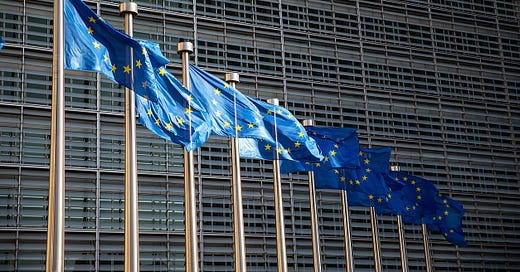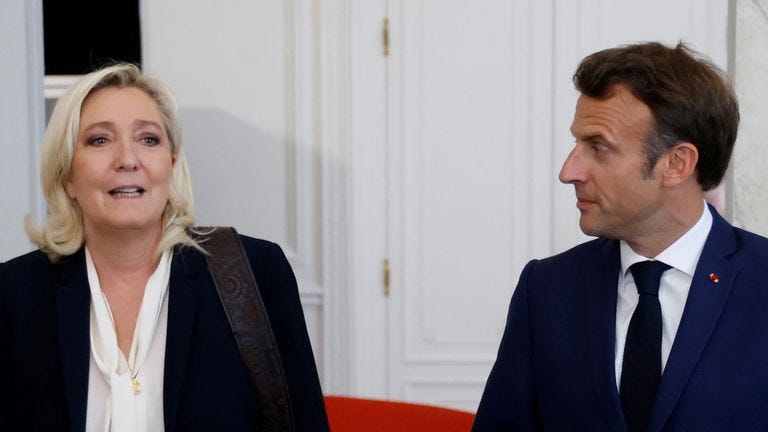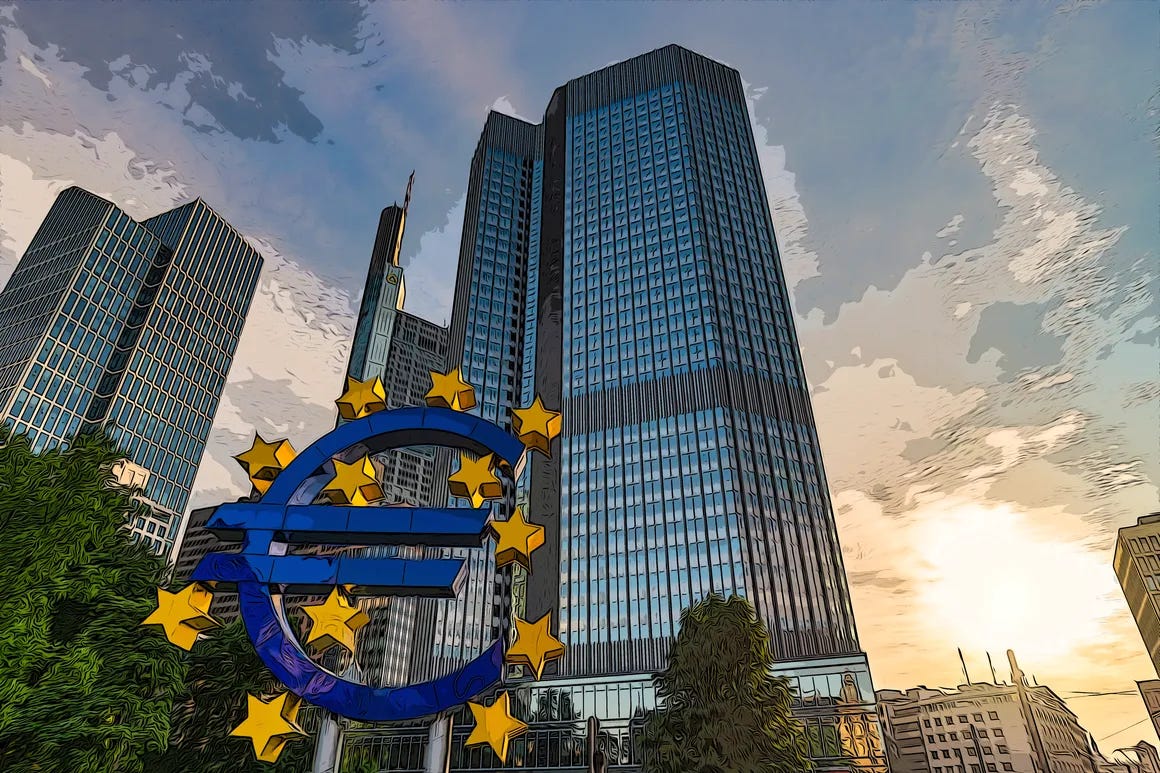Imagine this scenario.
The Irish government calls snap elections in, if predictions are to be trusted, late October of this year in order to build on the momentum of recently successful local elections.
However, polling indicates that local victories for the ruling parties appear to be confined to regional councils with national polling implying a swift victory for Sinn Féin and other micro left leaning parties to earn a sizeable portion of the vote to possibly form a government.
Thus, it appears likely that Sinn Féin may have a chance to nominate their preferred candidate for Taoiseach and secure the votes necessary.
Ireland's populist moment, that it was until recently immune to, beckons.
However, Ireland’s economic masters at the European Central Bank (ECB) have different plans.
Adhering to the, probably apocryphal, quote that “he who controls the money supply of a nation controls the nation”, Frankfurt seeks to strike a preemptive coup de grace at the far left party’s momentum.
‘Ireland risks a Truss moment if Sinn Féin gain power, warns ECB’, runs the headline from the Financial Times ahead of the election.
The headline is of course referring to the fallout from the short-lived - 44 days - U.K. prime minister Liz Truss and her ‘mini-budget’ in which unfunded tax cuts spooked the markets causing mortgage rates to soar, a run on the pound sterling and a gilt market free fall. Truss has since blamed her downfall on technocrats within the Bank of England who refused to buy up British debt to restore confidence in the markets.
The Irish press proceed to have a field day with such a startling pronouncement.
Headline after headline from The Irish Times to the Irish Examiner takes the Frankfurt line for gospel with one elderly Liveline caller speaking for the nation when she tells Joe Duffy, “Joe, you know, I don’t want to see the economy suffer, sure my grandkids would emigrate, that wouldn’t be good at all.”
The damage is done.
The further politicisation of the financial system will have major repercussions for democratic participation and usher in a class of faceless ruling technocratic elites holding EU member states to ransom with their thinly veiled threats of economic destruction
The narrative that a victory for Sinn Féin could jeopardize Ireland’s financial standing is seared in the minds of the wider public causing voters to abandon the party and vote for a safer pair of centrist hands instead.
Such a scenario sounds implausible and perhaps even a case of obscene and inappropriate political interference from unelected bankers and their enablers in the financial press.
However, this very situation is playing out in France right now.
Following a disappointing European election for the current Élysée occupant Emmanuel Macron and his Renaissance party, Europe’s quintessential centrist dad has dissolved the National Assembly and called snap elections in order to, as some analysts suggest, clip the wings of France’s right-wing National Rally under Marine LePen, and form a German style coalition with more moderate parties.
Such a gamble is easier said than done.
When Jacques Chirac attempted the same in 1997 he was left with an undesirable cohabitation arrangement with the socialists.
Meanwhile, polling suggests a clean sweep for LePen’s party.
Preempting the possibility of a right-wing government in Paris the ECB has all of a sudden, right before an election no less, sought to penalise France for its soaring deficits.
Just two weeks before elections are set to take place a headline from Bloomberg read:
‘The European Union is set to admonish France for breaking the bloc’s deficit and debt rules, triggering a process that can lead to onerous fines and complicating campaign priorities’ (my emphasis).
The FT followed suit in a conspicuous article outlining, ‘Why France’s Far Right is Spooking Markets’ which ‘could turn into a ‘Liz Truss-style’ liability on the campaign trail.’
French Finance Minister Bruno Le Maire joined in on the apocalyptic economic predictions saying that a victory for LePen would see France “experience the same dire consequences that followed a spending plan presented two years ago by then-UK Prime Minister Liz Truss, which resulted in her almost immediate downfall.”
The message from the financial elite is clear: vote the way we want or your economy will collapse.
The “spread” between French and German bond yields or cost of borrowing - a good bellwether for general economic health - is the largest it has been in years following the sudden snap election announcement. Yet the ECB refuses to intervene to correct this which they have the power to do.
Ireland’s man in Frankfurt, former Irish Central Bank Governor and current ECB chief economist Philip Lane, playing the role of general in the tentative economic coup, said that the ECB would not purchase French debt in order to calm market volatility.
France is on buying time: Wait until the electorate give the French and European financial elite what they want and then swoop in to relieve the economic system.
Such a blatant attempt at utilising the Euro to engineer a political outcome or maintain the status quo seems to be a recurring theme in the late stages of the world’s second largest currency.
Eurozone countries that dare express their sovereignty or independence are swiftly reminded of who is really in charge.
When Italian prime minister Giorgia Meloni clinched the top job on a populist agenda the ECB allowed interest rates to soar making Italy’s perennially heightened public debt costs unsustainable.
Only when Meloni caved on EU economic reforms did the ECB intervene.
This is not the first time Rome was made to toe the line.
Back in 2011, amid the fallout from the 2008 Financial Crisis, when Bunga Bunga prime minister of Italy Silvio Berlusconi refused to impose crushing austerity, under the terms of an IMF bailout, the ECB under super Mario Draghi discontinued the central bank’s Italian bond purchases thus raising interest rates. This helped usher in his downfall and the elevation of the former Goldman Sachs technocrat Mario Monti.
Indeed, closer to home, when Irish finance ministers Brian Lenihan Jnr and Michael Noonan, respectively, sought to burn the senior bondholders at the banks that had lent recklessly to developers during the Celtic Tiger fuelling the housing bubble then ECB president Jean Claude Trichet threatened that a “financial bomb” would go off in Dublin upsetting the stability of the Eurozone as a whole.
Both men caved and the Irish taxpayer was left to foot the €64 billion bill and other bruising cuts for such profligacy.
The social fallout from the crushing austerity that the EU forced upon member states has contributed massively to the current European populist wave, both from the left and right, enabled by voters who feel left behind economically.
From Berlin to Dublin national governments are warning that rising populism will upset the delicate stability of centrist governance that in actual reality has brought nothing but instability. Whether it’s a banking crisis, refugee crises, an energy crisis, rioting and an escalating war on the continent Europe has not screamed stability for a while now.
To avoid the massive backlash to the economic and social unease since 2008 the very institutions that contributed to such instability are pulling monetary tricks to quash a democratic and peaceful backlash at the ballot box.
The further politicisation of the financial system will have major repercussions for democratic participation and usher in a class of faceless ruling technocratic elites holding EU member states to ransom with their thinly veiled threats of economic destruction.





